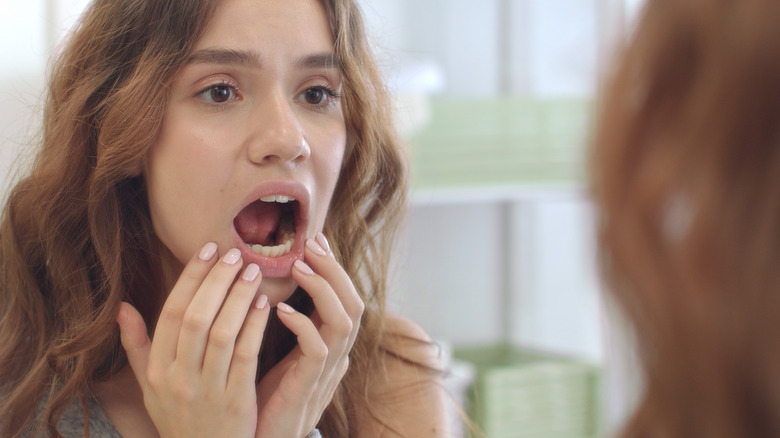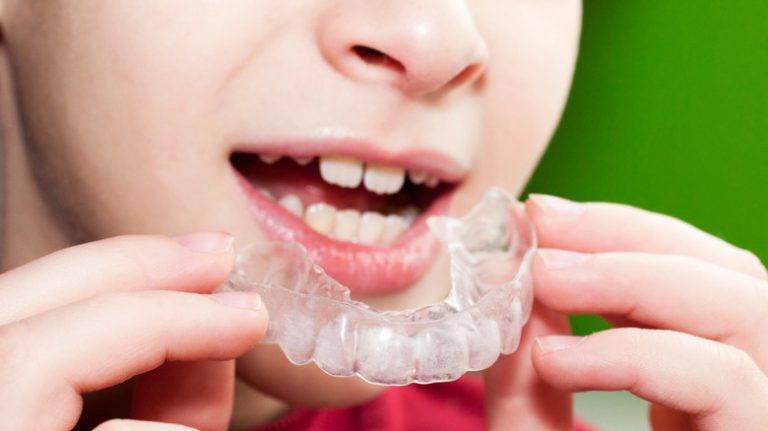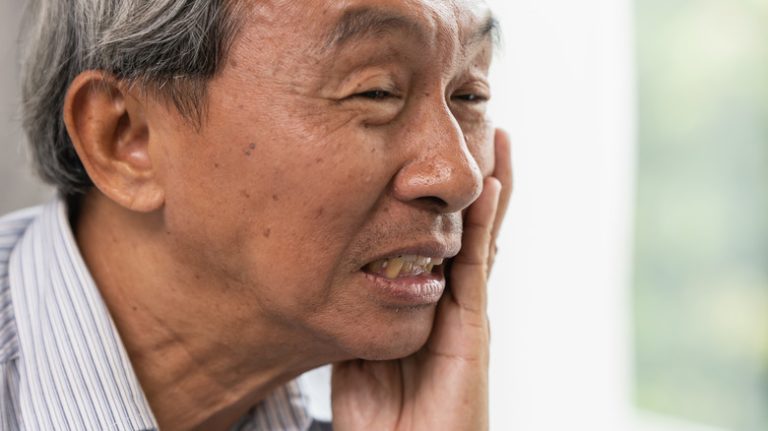Even with all the advancements in modern dentistry that make the experience as painless as possible, no one likes to think about having a tooth extracted. But sometimes, in order to improve our health, we need to address topics that aren’t pleasant. Learning more about a medical procedure can help you prepare better for it — and that can make a big difference, in terms of both the experience and the recovery time.
According to Smiles of Valparaiso, the reasons why someone might need a tooth extraction include the occurrence of large amounts of tooth decay, the tooth being broken or traumatized, or one’s wisdom teeth being impacted. Depending on why a tooth may need to be removed, there are three main types of tooth extractions. The most common are simple extractions, where the area is numbed and the dentist uses forceps for the procedure. As one would expect, impacted wisdom teeth require impacted tooth extraction. Finally, the removal of tooth roots is also considered a type of tooth extraction.
Regardless of what kind of tooth extraction you’re having, it’s important to remember two things. First, your dentist is there not only to perform the procedure, but also to answer any questions you might have. Second, there are things you can do prior to your tooth extraction that can help it go smoothly (and possibly reduce your recovery time). Here are some helpful tips shared by board-certified dentist Dr. Richard Lipari in an exclusive interview with Health Digest.
Make sure you get a restful night’s sleep
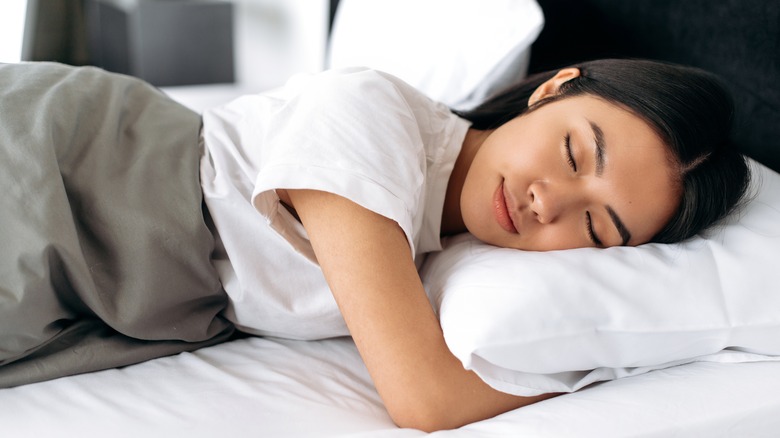
It’s the night before your tooth extraction, and despite going through your usual soothing bedtime routine, you find yourself too nervous to relax. Of course, it’s normal to be anxious before a dental procedure. But as Dr. Lipari told Health Digest, getting a good night’s sleep is very important before a tooth extraction.
According to Dental House, not getting a minimum of eight hours of sleep prior to a dental appointment can make the procedure harder to get through. Think of it this way: If you’re tired, you’re more likely to feel tense, which will only add to any nervousness you might be feeling about going to the dentist. Conversely, getting enough sleep and waking up refreshed can have a positive impact on your mood. But even if you’re not feeling anxious about a trip to the dentist, getting a full night’s rest can also help with your body’s recovery from a dental procedure.
While it’s easy to understand how sleep can be beneficial, it can still be difficult to relax the night before a tooth extraction. Fortunately, Klement Family Dental has tips that might help, like not staying up later than your normal bedtime and listening to white noise. Quiet Corner Dental also has pointers for calming one’s nerves at the dentist’s office (which can also be done the night before, to help with falling asleep). These include breathing exercises and listening to music.
You might need to avoid eating and drinking
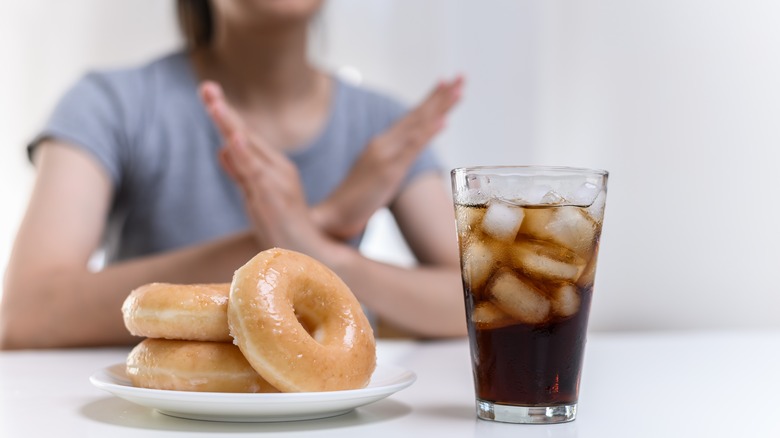
If you’re having a tooth extraction, you might have drugs to sedate you injected directly into your veins, via a procedure known as IV sedation (via The Foleck Center). There are some possible advantages to this form of sedation, like quick recovery time. It also tends to be safer than general anesthesia. But as Dr. Lipari noted to Health Digest, “If you’re having IV sedation especially, there may be some rules and restrictions the doctor may have you follow, such as not eating the morning of the procedure.”
According to Fairfax Oral & Maxillofacial Surgery, you should not eating for six hours before IV sedation. However, dentist Dr. M. Darrh Bryant says that avoiding eating or drinking for 12 hours before a surgery (like the kinds done for tooth extractions) can help reduce the chances of experiencing nausea while or after the operation.
In short, it’s important to discuss the different options you have for sedation and anesthesia with your dentist. This discussion can include restrictions regarding eating and drinking, as well as other concerns (like if you need water to take medication). Dr. Bryant says you should also let your dentist know about other health conditions that could be an issue, such as diabetes.
Plan to show up early for your appointment
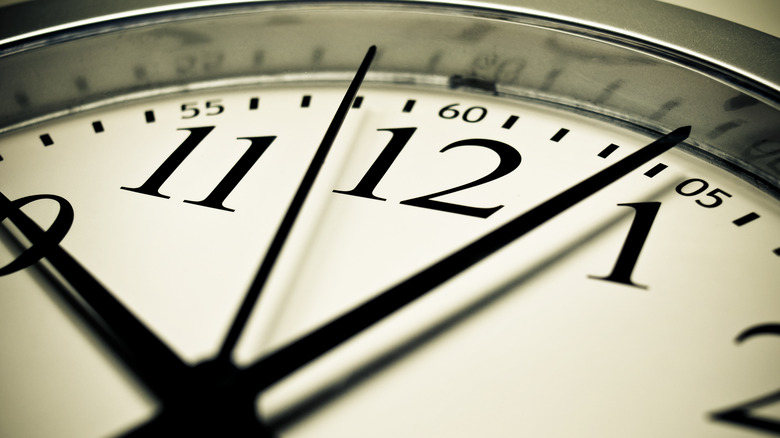
Tsuji/Getty Images
There are many valid reasons why a person could end up being late for a prior commitment. However, while it’s typically not a big deal to be tardy with an understanding friend, not being on time for a dental appointment can have grave consequences. As Dr. Lipari told Health Digest, when having a tooth extraction, it’s important to figure out how to be at your appointment a few minutes earlier than your actual schedule: “You don’t want the added stress of rushing to the appointment the day of the procedure.”
In fact, if you have paperwork and additional questions to ask prior to having dental surgery, you might want to show up as much as a half an hour ahead of time (via Pine Tree Dental Care). With that said, you might want to ask your dentist’s office how early you should show up for your procedure. Pre-appointment questions like what information you’ll need for your paperwork can also be covered at this time.
Being early for a tooth extraction is a good idea, but is it truly that bad if you’re late? As Verber Family Dentistry explains, not being on time for a dental appointment could mean you’ll need to reschedule it (although what you’re having done is taken into consideration). Nevertheless, if you’re running late, let your dentist’s office know right away. Also, make your appointment well enough in advance, so you can clear your schedule for that day.
Be extra thorough about brushing and flossing
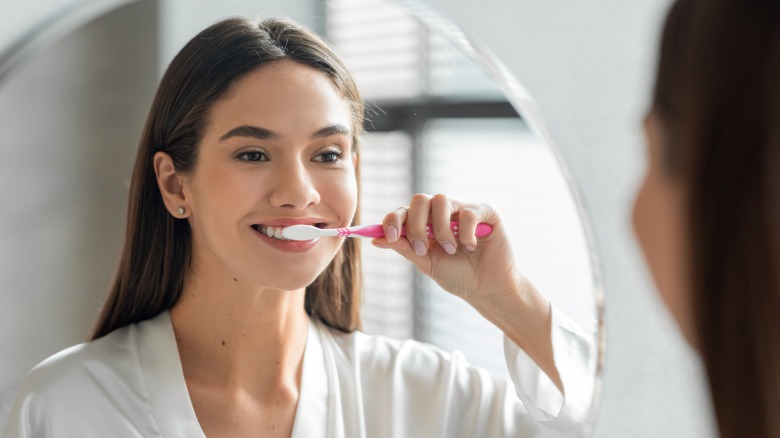
Prostock Studio/Shutterstock
We’ve all been told about the importance of good dental hygiene. Keeping up with your brushing and flossing routine reduces the chances of developing oral health problems like tooth decay, cavities, and gum disease (via Community Health of Central Washington). And if you’re having a tooth extracted, it’s important to take extra care when cleaning your teeth.
“Brush and floss your teeth thoroughly the night before, especially in the area of the tooth to be extracted,” Dr. Lipari told Health Digest. As a matter of fact, Santa Rosa & Rohnert Park Oral Surgery includes brushing one’s teeth as part of their instructions for patients having their wisdom teeth removed. Proper brushing helps reduce the amount of bacteria in your mouth, which means you’re less likely to develop an infection following a tooth extraction. Otherwise, it’s possible to have a bone infection post-surgery, which can escalate into sepsis and potentially harm organs throughout the body (per Maiden Lane Dental).
Besides putting extra focus on where the extraction is taking place, you may also want to follow the tips from Dental Implant Surgery & Periodontics on how to brush and floss more effectively. These include brushing in gentle, circular motions on the sides of your teeth while moving the brush back and forth on the chewing surfaces. Additionally, move the floss up and down several times to really get rid of all food particles.
Don’t smoke or drink alcohol

Tatyana Berkovich/Shutterstock
It’s not uncommon for someone to ritualistically have a can of beer or a glass of wine after a hard day of work. Unsurprisingly, smoking can also become part of a regular routine. But when you’re having a medical procedure done, that can mean changing what you normally do, even well in advance of the actual procedure.
Case in point: According to Dr. Lipari, if you’re having a tooth extraction, there should be “no alcohol or smoking 24 hours prior to the procedure as this can slow the body’s healing process.” Southside Medical Center cautions patients that alcohol can complicate dental procedures in several ways, including making it harder for one’s body to absorb anesthesia. A patient might also experience more bleeding if they have alcohol in their system. Smoking tobacco can also raise the odds of complications occurring during dental surgery. Plus, a patient who is a smoker is more likely to develop a post-procedure infection.
Beyond possibly impacting a tooth extraction, smoking could cause health problems like oral cancer and gum disease. Additionally, you’re more likely to develop immune system issues if you either smoke tobacco or drink alcohol. And that’s not all: The likelihood of having problems with fertility or developing heart and lung diseases goes up if you smoke. Lastly, there might be a connection if someone regularly drinks alcohol and experiences unpleasant shifts in their mood.
Choose loose-fitting, comfortable clothes
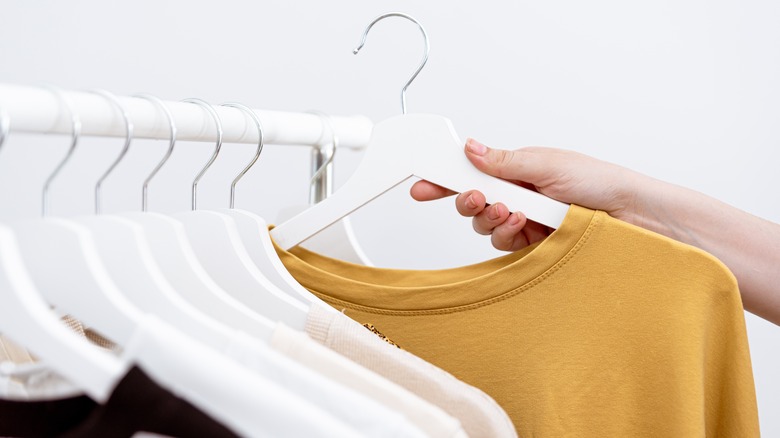
Damian Lugowski/Shutterstock
Clothing can affect a person’s state of mind. Unsurprisingly, wearing a comfortable shirt would be the best choice for a tooth extraction, since it can have a good psychological effect on you. However, that’s not the only thing to consider when putting together an outfit for a dental appointment.
As Dr. Lipari advised, “Wear something comfortable and try to avoid clothes that are particularly tight.” While your favorite shirt would likely check both those boxes, opting for loose clothing might be ideal. Sometimes, a dentist will use IV sedation, which can involve inserting a needle into the arm (via Gulch Dental Studio). Oral Surgeons, PC recommends wearing loose-fitting clothes, so the dentist can administer the procedure with ease. Moreover, Wisdom Teeth Only By Specialists says that when choosing a shirt to wear for your appointment, you should pick one with sleeves that you can roll past the elbow without a problem.
Besides avoiding tight-fitting clothing, it’s a good idea to wear shoes that are either flat or have low heels if you’re having wisdom tooth surgery. Also, don’t wear jewelry or nail polish — and if you put on makeup, keep it to a minimum (and don’t use lipstick).
Arrange for someone to pick you up (if necessary)

Inside Creative House/Shutterstock
There are definite pluses to having someone drive you to and from a tooth extraction. You’ll have one less thing to worry about, as being anxious behind the wheel can be dangerous. But beyond reducing stress, you might not be allowed to drive after your procedure.
“If you are going ‘to sleep’ for the extraction, you will not be able to drive home after and you will need someone to pick you up,” shared Dr. Lipari. As the Cleveland Clinic notes, you’ll need a ride home after oral conscious sedation (where the dentist might give you a pill that makes you sleepy). In fact, it’s best to arrange for a ride home with almost all types of sedation dentistry, save for sedation by nitrous oxide (a.k.a. laughing gas). Additionally, don’t be tempted to share a ride or ride a taxi; instead, have a friend or family member you trust do the driving.
According to Texas Wisdom Teeth & Dental Implants, it’s usually okay to drive after local anesthesia (in which only the area of the mouth where the extraction is occurring is numbed). With that said, local anesthesia can be distracting while driving. Ultimately, it’s a good idea to talk with your dentist about whether or not it’s safe to drive after a procedure — and even if it is, it might be best for you to just arrange for a ride.

